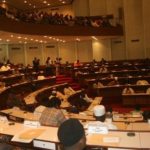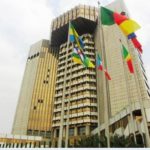Explanations and counter explanations between Parliamentarians and the minister for Territorial administration and decentralization characterize the ongoing extraordinary session of parliament.
Submitted and rejected during the ordinary session of parliament gone by, the electoral code expected to govern the organization of future elections in Cameroon is yet to be accepted by Members of parliament. The Parliamentary Group of the ruling Cameroon people’s democratic movement (Cpdm) say “modifications must be made to ensure that in the future, history doesn’t sound unfair to us”. Brainstorming on Monday April 9 with these parliamentarians at the Conference Centre, Minister René Sadi and party’s Secretary general Jean Nkuete presented the methodology of the code’s conception, its innovations as well as aspects left aside. According to Mr Sadi, “the bill is an unequivocal commitment of the Head of State to perfect Cameroon’s electoral system.” “As instructed by the President of the Republic”, he went on, “the Prime minister and Head of government concerted with civil society organizations, University dons, religious leader et al in accordance with our country’s constitution for the elaboration of this bill”. While presenting the code’s outlook, he insisted on the fact that it contains readjustments in relation to Elections Cameroon, takes into account the use of biometric devices in the electoral process , it is gender conscious, allows pulling stations to announce trends, increases the caution of officials vying for elective positions and permits the state treasury to fund campaigns. Debates entered a higher gear with Hon Mbiam Emmanuel of Ntem Valley who suggested that the caution for the post of President of the Republic be increased from 30 to 100 million. This he said “will reduce the number of adventurers involved in presidential elections, as was the case in last year’s presidential election”. He later on questioned the section of the code which holds that to be eligible for the post of President of the Republic; the candidate must be of Cameroonian origin. “By birth, adoption, marry,…”, he sought to know. Hon Martin Oyono also questioned the rationale of section 166 on the caution of MPs that has been increased from Fcfa 500,000 to 5 million. His peers were all unanimous that this amount should be reduced. Another unclear aspect of the code is that it recognizes alternate Members of parliament, meaning, they would partake in parliamentary activities. How? The bill further reduces the number of municipal councilors from 40-35 and makes no strong statement on the salaries on mayors and their site of residence, issues which have been pending over the years. Female MPs focused their concerns on the fact the code does not contain a provision which clearly increases the number of women in the National Assembly. Controversies!Parliamentarians of the Cpdm demonstrated their fears over the fact some provisions of the code under scrutiny are anti constitutional. In this light, section 47(a) for instance says people convicted for felony or in default would not register on electoral registers. From a legal stand point, the phrase “convicted in default” presupposes that there was an unfair judgment. Not allowing victims of unfair judgments to vote is an act which is repugnant to the very preamble of the constitution which fully recognizes the notion of presumption of innocence. Also, section 150(1) provides that the National Assembly is made up of 180 parliamentarians whereas the constitution holds that the number of parliamentarians is proportional to the population of Cameroon. Further, according to section 161(4), any parliamentarian or alternate Member of parliament who resigns from his/her political party will be expelled from the National Assembly. This brings to light the issue of imperative mandates which are not recognized by the constitution. It is also to be noted that some Members of parliament brought up causeless concerns. They questioned section 140 which pans on the swearing in ceremony of the President of the Republic. It says, inter alia that …the President of the Republic solemnly swears before God and Man… According to these MPs, this provision is to be expunged because the preamble of the constitution holds that Cameroon is a secular state. Yet, being a secular state simply means there is no state religion. After the two dozens of questions put up to minister Sadi and to the Secretary General of the party’s Central committee, their answers sounded convincing. “I want to commend you for your insightful questions, comments and suggestions as far this bill is concerned. We will do a review of the aspects you raised and reasonable amendments would be done”. At the end of the 7 hour exchange, Mr Jean Nkuete thanked MPs for the wonderful collaboration they have with government. “I urge you all to be united and unanimous in your support as far as passing this bill into law is concerned”, he wished.




